
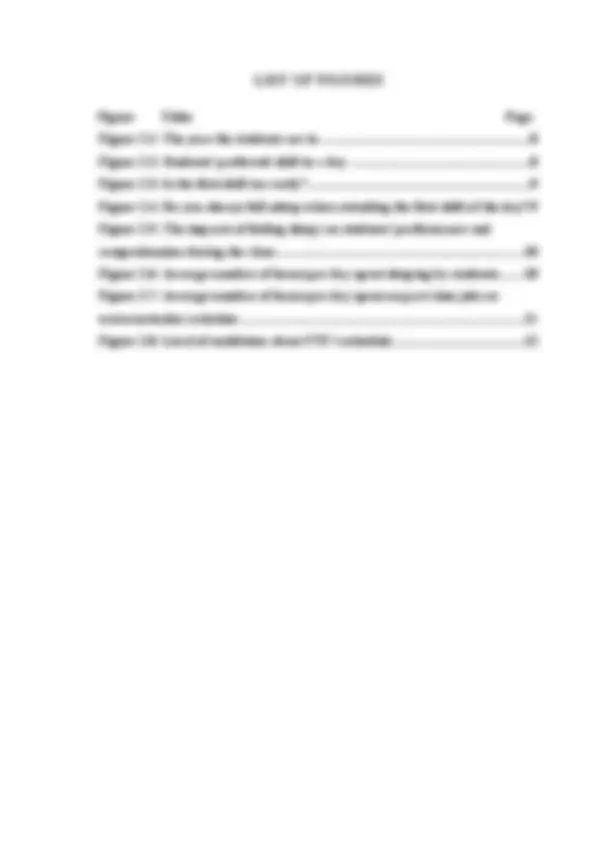
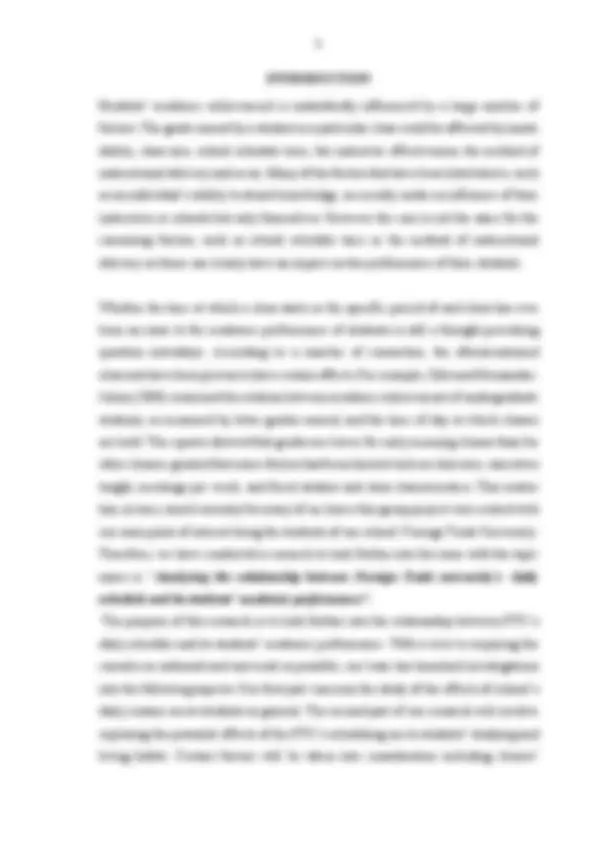

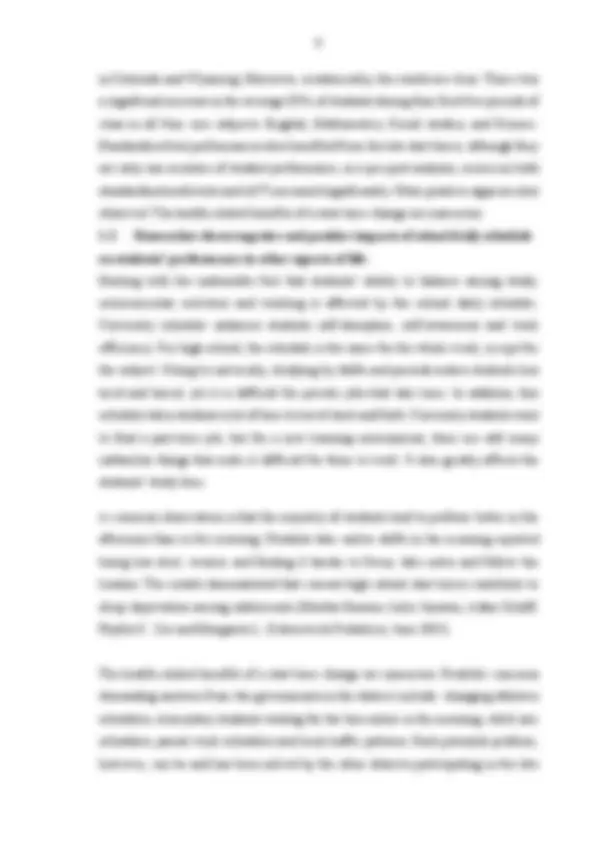
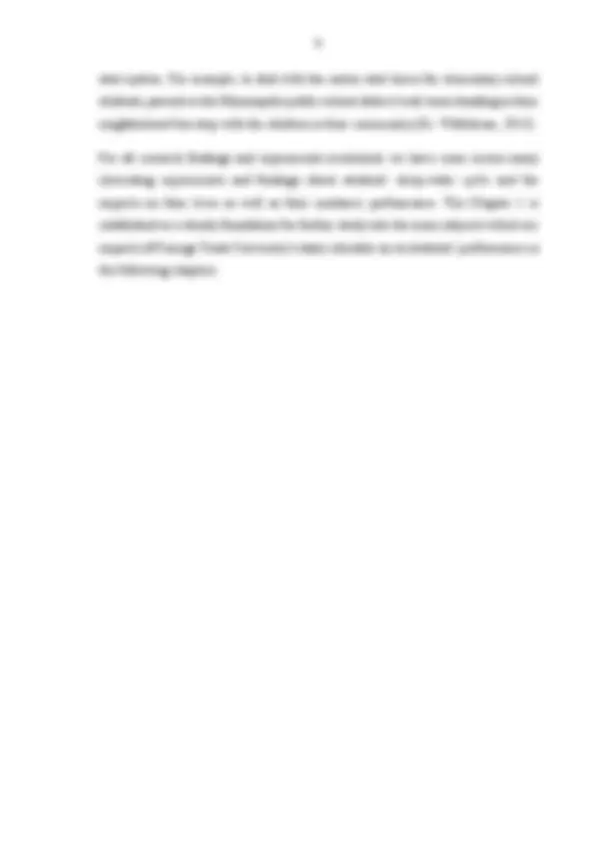
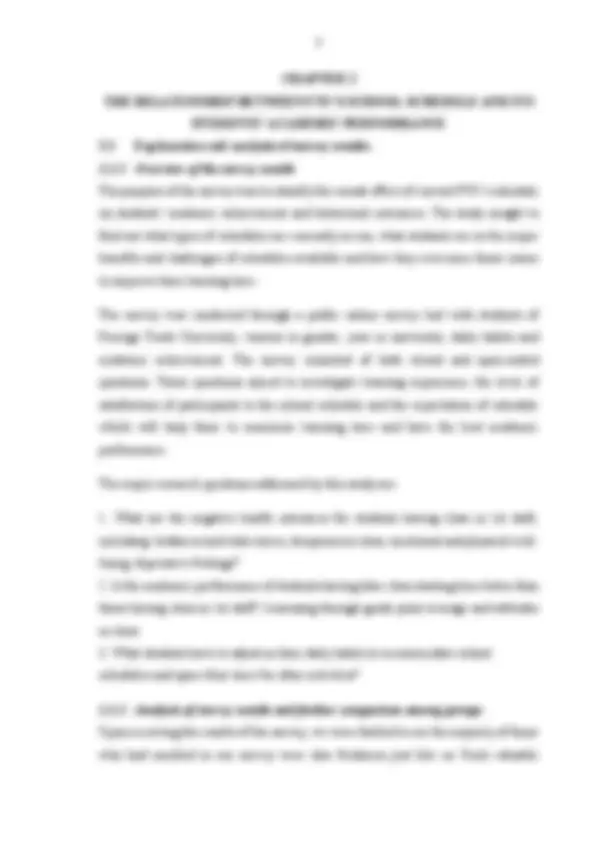


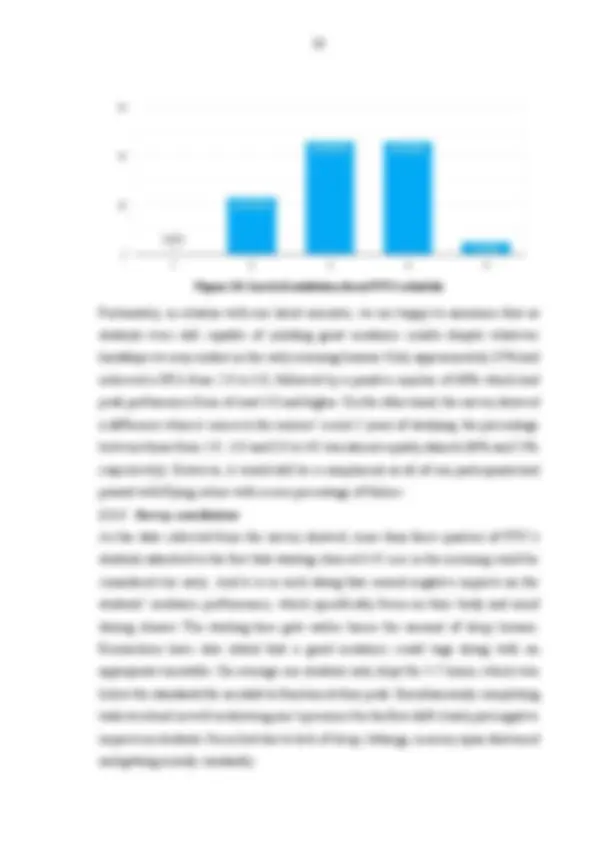
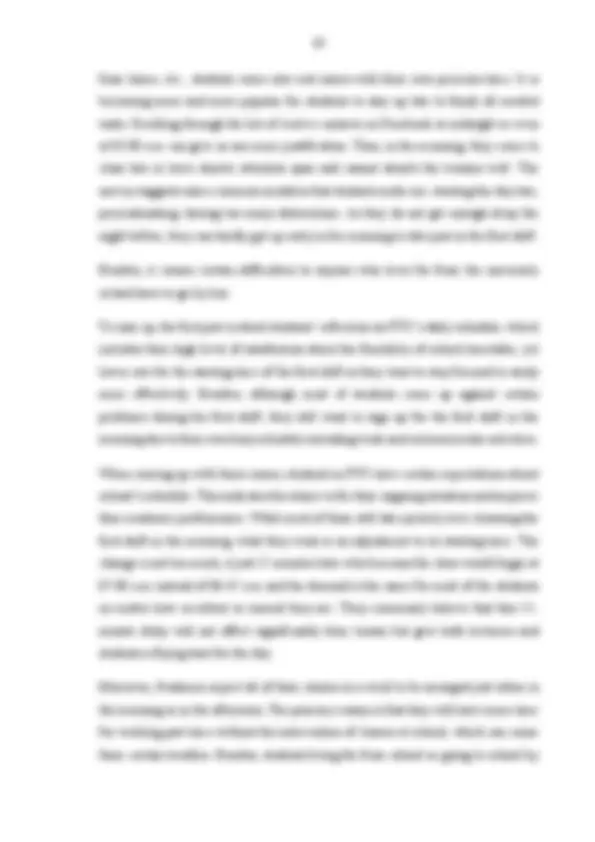
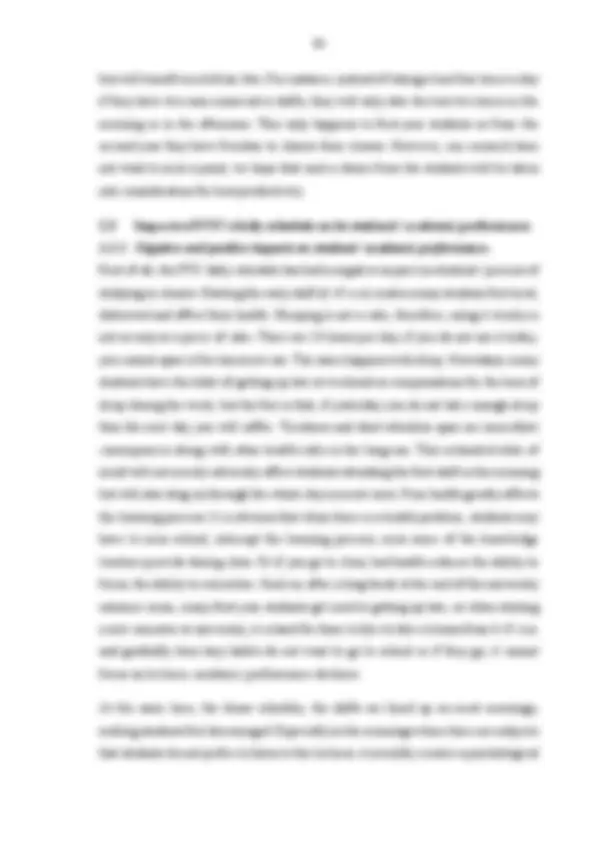
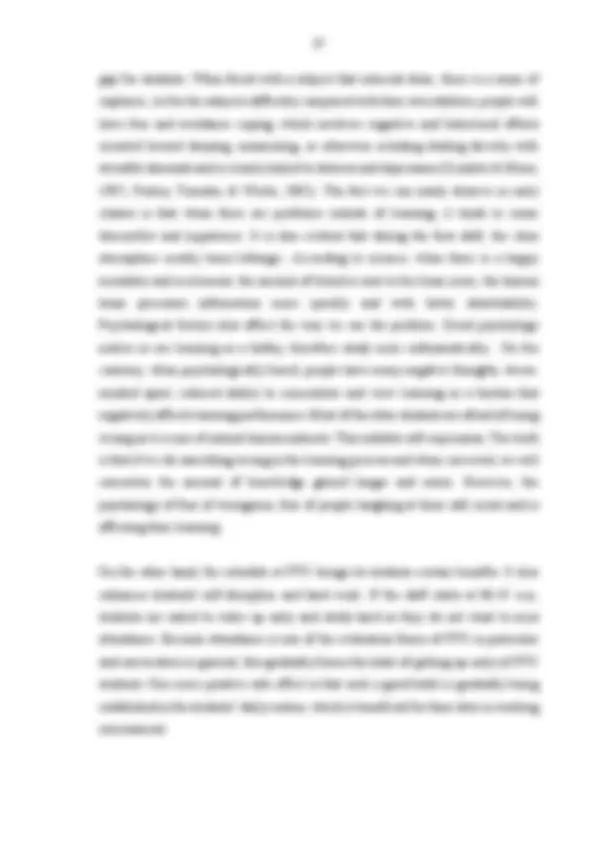
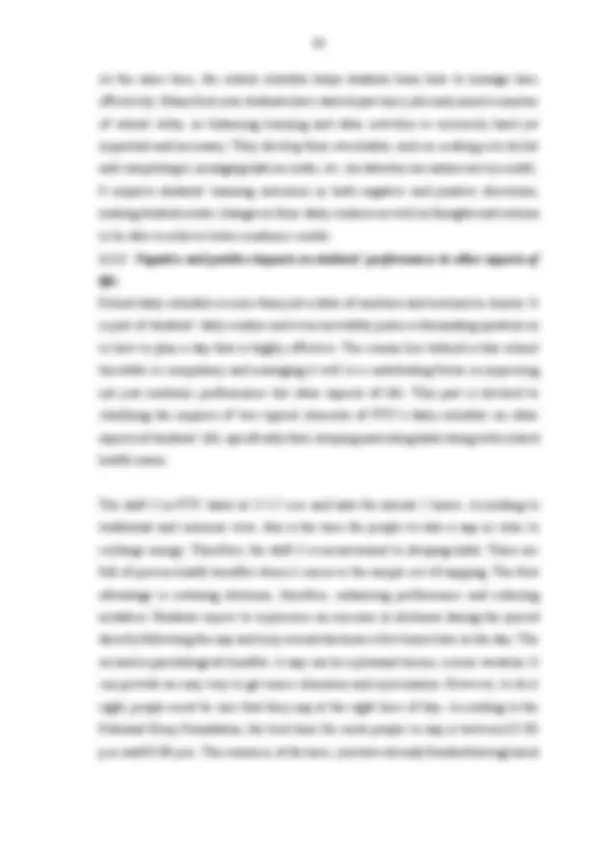
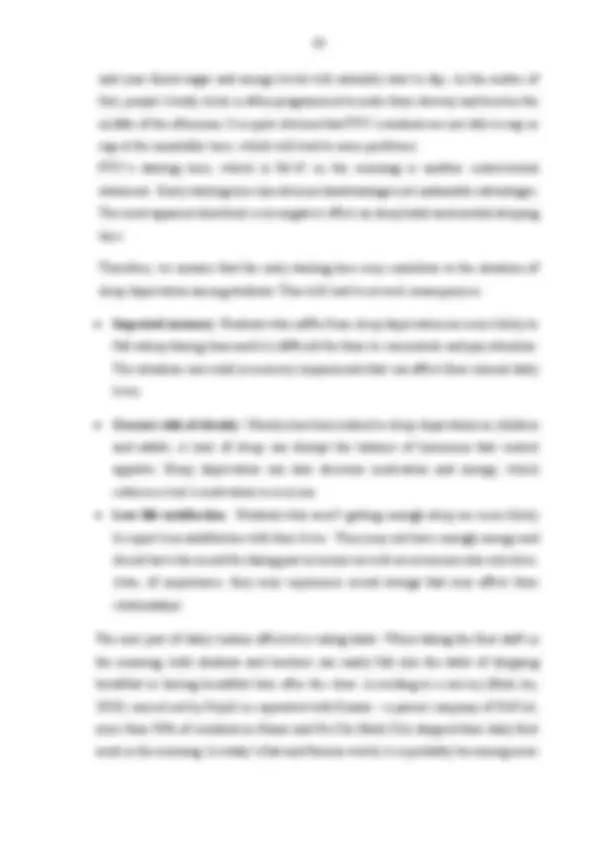
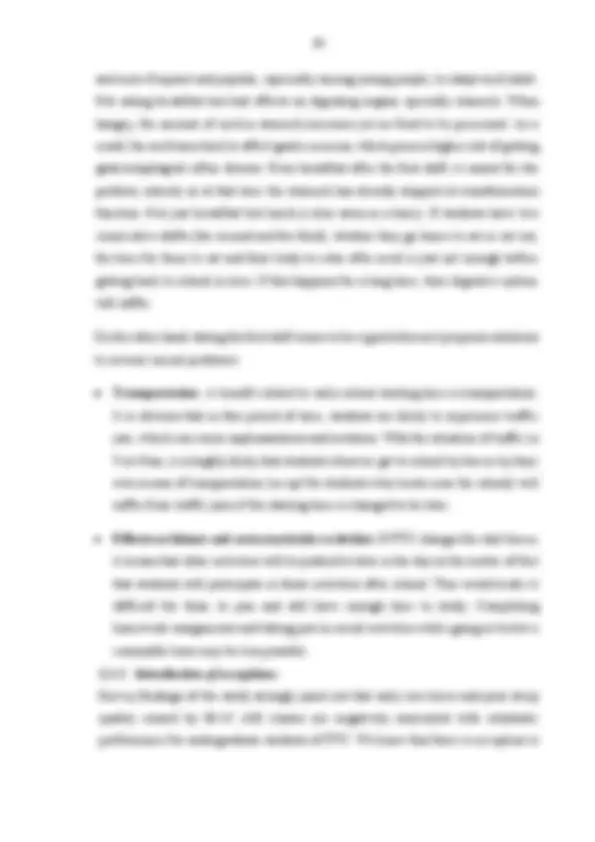
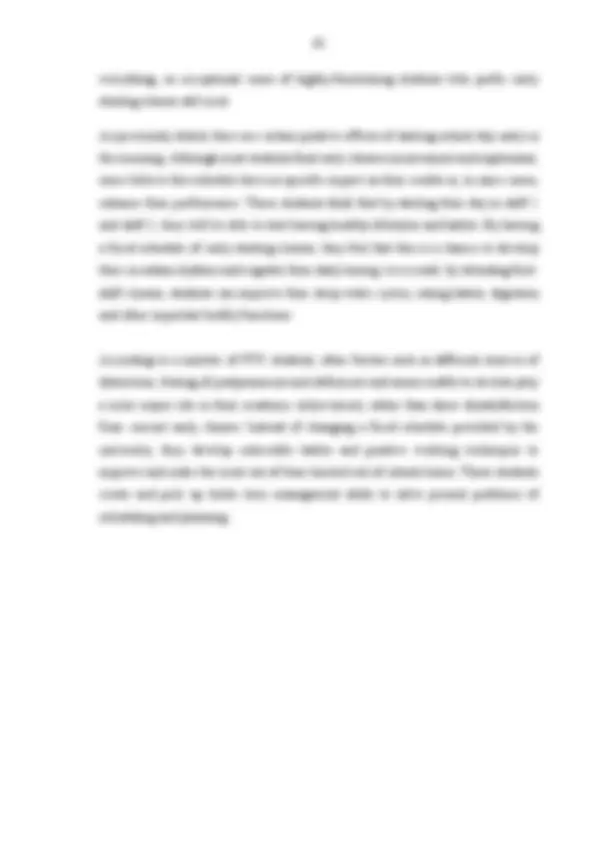
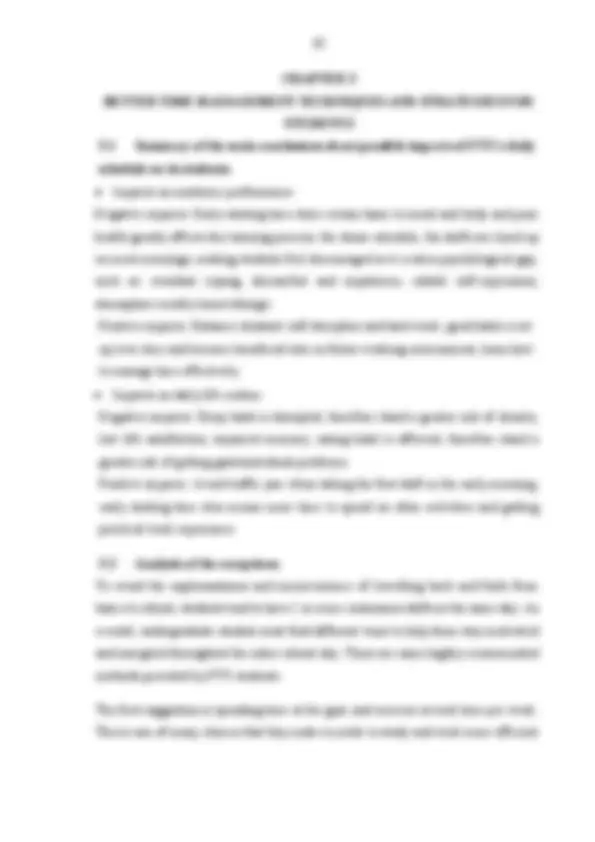
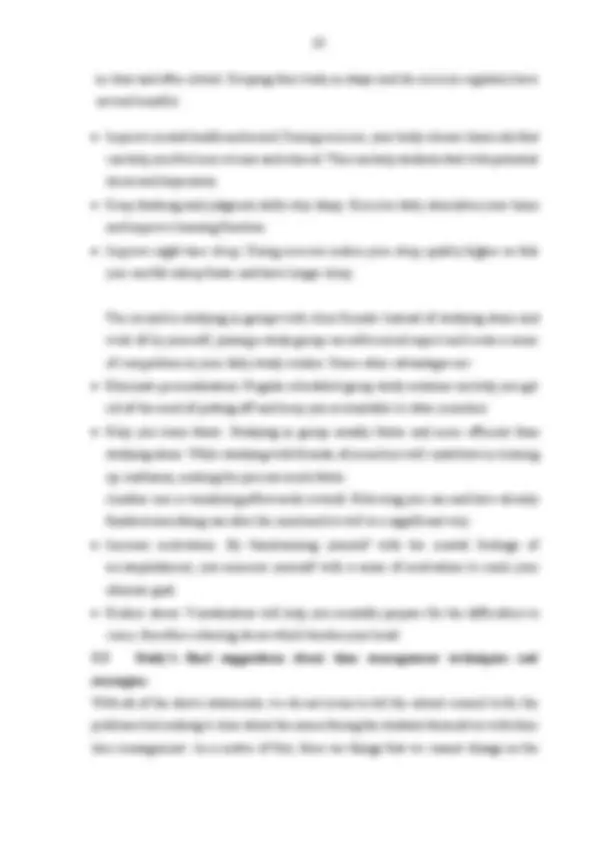
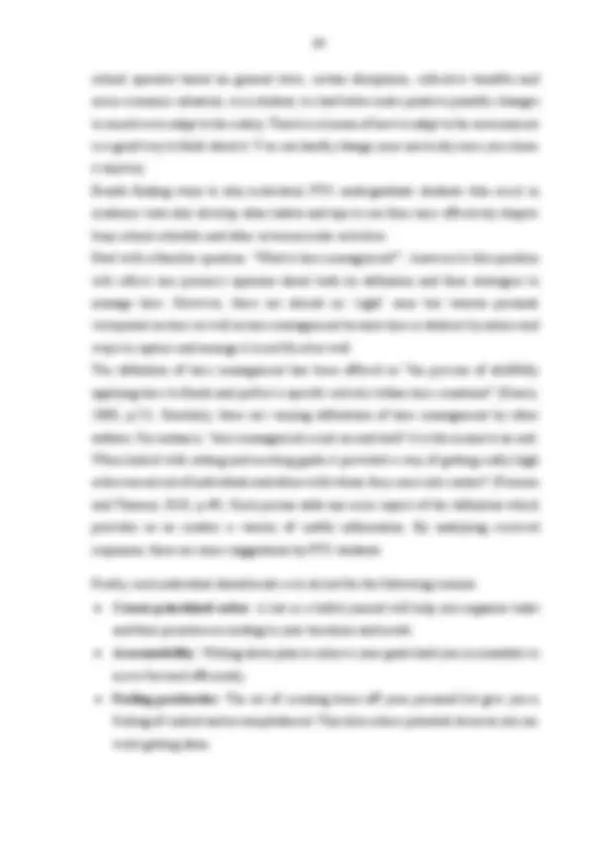
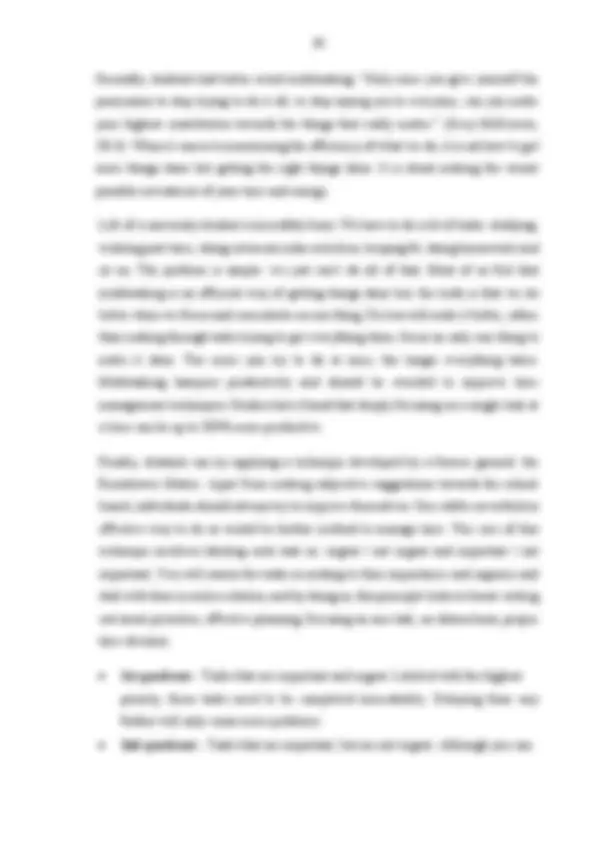
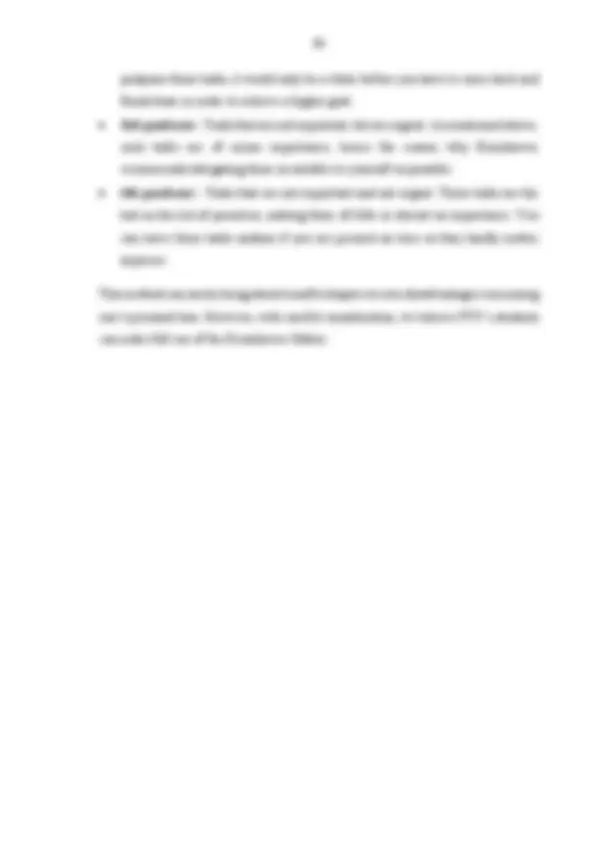
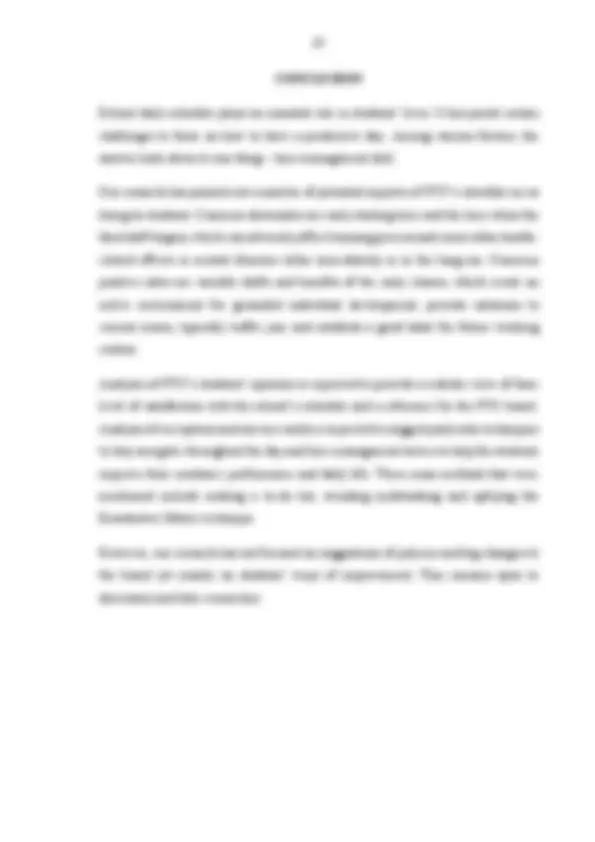
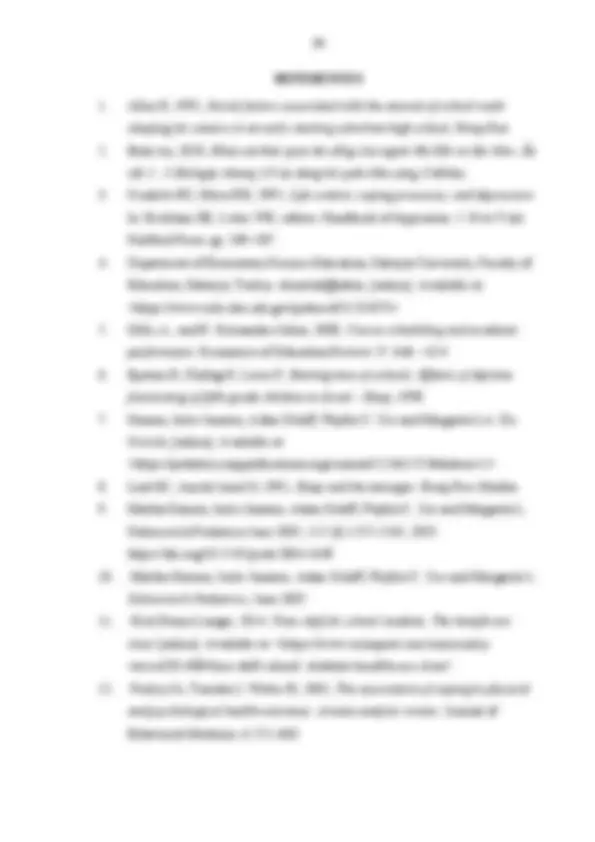



Study with the several resources on Docsity

Earn points by helping other students or get them with a premium plan


Prepare for your exams
Study with the several resources on Docsity

Earn points to download
Earn points by helping other students or get them with a premium plan
Community
Ask the community for help and clear up your study doubts
Discover the best universities in your country according to Docsity users
Free resources
Download our free guides on studying techniques, anxiety management strategies, and thesis advice from Docsity tutors
The purpose of this research is to look further into the relationship between FTU’s daily schedule and its students’ academic performance. With a view to acquiring the remarks as unbiased and universal as possible, our team has launched investigations into the following aspects.
Typology: Thesis
1 / 32

This page cannot be seen from the preview
Don't miss anything!

























-------***------
TABLE OF CONTENTS
INTRODUCTION ..................................................................................................... CHAPTER 1 : Significant researches about impacts of school daily routine on students’ performance .............................................................................................. 1.1 Researches about negative and positive impacts of school daily schedule on students’ academic performance .................................................................... 1.2 Researches about negative and positive impacts of school daily schedule on students’ performance in other aspects of life. .............................................. CHAPTER 2 : The relationship between FTU’s school schedule and its students’ academic performance ............................................................................. 2.1 Explanation and analysis of survey results. ................................................. 2.1.1 Overview of the survey results .................................................................. 7 2.1.2 Analysis of survey results and further comparison among groups ........ 7 2.1.3 Survey conclusions ................................................................................. 12 2.2 Real situation and further consideration ................................................... 2.2.1 Comparison between our conclusions and precedented research findings. ............................................................................................................. 13 2.2.2 FTU’s students’ common reflection on its daily schedule and their expectations. ...................................................................................................... 14 2.3 Impacts of FTU’s daily schedule on its students’ academic performance 16 2.3.1 Negative and positive impacts on students’ academic performance..... 16 2.3.2 Negative and positive impacts on students’ performance in other aspects of life. .................................................................................................... 18 2.3.3 Introduction of exceptions ...................................................................... 20 CHAPTER 3 : Better time management techniques and strategies for students ................................................................................................................................... 3.1 Summary of the main conclusions about possible impacts of FTU’s daily schedule on its students. ...................................................................................... 3.2 Analysis of the exceptions. ........................................................................... 3.3 Study’s final suggestions about time management techniques and strategies. .............................................................................................................. CONCLUSION ........................................................................................................ REFERENCES ........................................................................................................
Students’ academic achievement is undoubtedly influenced by a large number of factors. The grade earned by a student in a particular class could be affected by innate ability, class size, school schedule time, the instructor effectiveness, the method of instructional delivery and so on. Many of the factors that have been listed above, such as an individual’s ability to absorb knowledge, are mostly under no influence of their instructors or schools but only themselves. However the case is not the same for the remaining factors, such as school schedule time or the method of instructional delivery as these can clearly have an impact on the performance of their students.
Whether the time at which a class starts or the specific period of said class has ever been an issue to the academic performance of students is still a thought-provoking question nowadays. According to a number of researches, the aforementioned elements have been proven to have certain effects. For example, Dills and Hernandez- Julian (2008) examined the relation between academic achievement of undergraduate students, as measured by letter grades earned, and the time of day at which classes are held. The reports showed that grades are lower for early morning classes than for other classes, granted that some factors had been limited such as class size, semesters taught, meetings per week, and fixed student and class characteristics. This matter has, in turn, raised curiosity for many of us, hence this group project was created with our main point of interest being the students of our school: Foreign Trade University. Therefore, we have conducted a research to look further into the issue with the topic name is: “Analyzing the relationship between Foreign Trade university’s daily schedule and its students’ academic performance”. The purpose of this research is to look further into the relationship between FTU’s daily schedule and its students’ academic performance. With a view to acquiring the remarks as unbiased and universal as possible, our team has launched investigations into the following aspects. Our first part concerns the study of the effects of school’s daily routine on its students in general. The second part of our research will involve exploring the potential effects of the FTU’s scheduling on its students’ studying and living habits. Certain factors will be taken into consideration including classes’
starting points, the duration of breaks between consecutive shifts. We will also allow for further study into time periods of each shift, all the while collecting feedback and comments from the students via online survey. By doing so, we hope to be able to understand thoroughly the relationship between FTU’s school schedule and its students’ academic performance. Additionally, upon receiving the responses, we would also like to compose a list of suggestions primarily made possible for FTU students with all due intention of helping them better their results and maximize the most positive impacts on their academic performance.
reported to have later school starting time, shorter sleep latencies, better sleep quality with fewer sleep waking and fewer school day naps. On the other hand, students with lower GPAs (from 1 to 3.5) reported signs of daytime sleepiness, poor sleep quality during night. Another worth mentioning finding was a trend for students with better performance to sleep longer on school nights (7.4 vs 7 hours).
In another small-scale study (Allen R., 1992, Social factors associated with the amount of school week sleep lag for seniors in an early starting suburban high school, Sleep Res) compared seventy two 12 th graders with a 7:40 a.m school start time to 30 other 12th graders with a 8:30 a.m start. These studies completed a sleep-wake questionnaire in human behavior class, covering school and weekend sleep patterns, average grades and social habits. Students with earlier start time reported to have shorter school-night total sleep, more sleep-related problems and sleeping in later on the weekends.
Reports (Epstein R. and Chillag N.,1998, Starting time of schools: Effects of daytime functioning of fifth-grade children in Israel, Sleep) examined data of 6495 Israeli students. These findings also reported significant correlations of total sleep time with the ability to concentrate in school, tendency to doze off during school time and frequency of school tardiness. The investigators compared students with different school start time: 7:15 a.m or earlier and 8:00 a.m. The former group stated to have more frequent complaints of daytime fatigue and sleepiness throughout the school day.
Besides, as a resolution to the problem, a lot of school authorities have officially changed their start time to see how later schedule can make a difference to their students’ academic performance. Research carried by Dr. Wahlstrom’s on mỏe than 12000 students in late 2013 had provided for the St. Paul Public School (SPPS) proposed change. The proposal for SPPS would begin middle and high school classes at 8:30 a.m instead of 7:00 a.m as before. Dr.Wahlstrom’s report contributes many strongly proven academic and health-related benefits to shifting the start times. The study followed multiple, diverse school districts that have implemented changes in start times including Edina and Minneapolis public school districts as well as schools
in Colorado and Wyoming. Moreover, academically, the results are clear. There was a significant increase in the average GPA of students during their first few periods of class in all four core subjects: English, Mathematics, Social studies, and Science. Standardized test performances also benefited from the late start times, although they are only one measure of student performance, in a pre-post analysis, scores on both standardized math tests and ACT increased significantly. Other positive signs are also observed. The health-related benefits of a start time change are numerous. 1.2 Researches about negative and positive impacts of school daily schedule on students’ performance in other aspects of life. Starting with the undeniable fact that students’ ability to balance among study, extracurricular activities and working is affected by the school daily schedule. University schedule enhances students self-discipline, self-awareness and work efficiency. For high school, the schedule is the same for the whole week, except for the subject. Going to university, studying by shifts and periods makes students less tired and bored, yet it is difficult for private jobs that take time. In addition, this schedule takes students a lot of time to travel back and forth. University students want to find a part-time job, but for a new learning environment, there are still many unfamiliar things that make it difficult for them to work. It also greatly affects the students’ study time.
A common observation is that the majority of students tend to perform better in the afternoon than in the morning. Students take earlier shifts in the morning reported being less alert, wearier and finding it harder to focus, take notes and follow the lessons. The results demonstrated that current high school start times contribute to sleep deprivation among adolescents (Martha Hansen, Imke Janssen, Adam Schiff, Phyllis C. Zee and Margarita L. Dubocovich Pediatrics, June 2005).
The health related benefits of a start time change are numerous. Realistic concerns demanding answers from the governments in the district include: changing athletics schedules, elementary students waiting for the bus earlier in the morning, child care schedules, parent work schedules and local traffic patterns. Each potential problem, however, can be and has been solved by the other districts participating in the late
2.1 Explanation and analysis of survey results. 2.1.1 Overview of the survey results The purpose of the survey was to identify the causal effect of current FTU’s schedule on students’ academic achievement and behavioral outcomes. The study sought to find out what types of schedules are currently in use, what students see as the major benefits and challenges of schedules available and how they overcome those issues to improve their learning time.
The survey was conducted through a public online survey tool with students of Foreign Trade University, various in gender, year in university, daily habits and academic achievement. The survey consisted of both closed and open-ended questions. These questions aimed to investigate learning experience, the level of satisfaction of participants to the school schedule and the expectation of schedule which will help them to maximize learning time and have the best academic performance.
The major research questions addressed by this study are:
2.1.2 Analysis of survey results and further comparison among groups Upon receiving the results of the survey, we were thrilled to see the majority of those who had enrolled in our survey were also freshmen just like us. Such valuable
participations not only tremendously helped us collect data from those of the same age and, hopefully, same mindset but also created an opportunity to speak out to the FTU’s board and express our first-hand experience in college.
Figure 2.1: The year the students are in
As we all know, first-year students have their own merits in many ways, and one of them is the help from the school to organize their schedule automatically. After finishing our first year, we would surely move onto dealing with the above task ourselves. Here the results show that, regardless of which year should be, the most famous, if not favorable, time to study is in the morning specifically our first shift (6:45 a.m. to 9:10 a.m.)
Figure 2.2: Students' preferred shift in a day
57,50%
15,80%
19,20%
6% 1,50%
Freshman Sophomore Junior Senior Older
39,20%
30,80%
23%
5% 2%
1st shift 2nd shift 3rd shift 4th shift 5th shift
Figure 2.5: The impacts of feeling sleepy on students' performance and comprehension during the lesson
Next, we conducted a review on their amount of sleep everyday showing a fair number (41%) spent 5 to 7 hours on sleeping, followed by the moderate healthy rate of 7 to 9 hours in second place (27.5%). While about 16% of them had a rather peaceful and long-lasting sleep of 9 hours, only 14% of which slept for less than 5 hours on average. We also found out that other than studying, they also spent time on other essential objectives such as part-time jobs or extracurricular activities. They had been seemingly working for 1 to 5 hours on end. We believe this can also be a contributing factor to their amount of sleep throughout the day.
Figure 2.6: Average number of hours per day spent sleeping by students
1 (0,80%)
15 (12,50%)
51 (42,50%)
53 (44,20%)
61 (50,80%)
76 (63,30%)
71 (59,20%)
Hard to acquire new information
Do not feel sleepy
Be moody and easily have nagative feeling
Find it hard to acquire new information
Feel tired
Lack of concentration
14,20%
27,50% 41,60%
16,70% (^) Less than 5 hours 5-7 hours 7-9 hours More than 9 hours
Figure 2.7: Average number of hours per day spent on part-time jobs or extracurricular activities
When being asked about the length of each break, we received more than half of the responses agreeing to the breaks being rather short on normal terms. This surely sparked inside them their own preferences for the amount of time a break could have taken. The survey showed a majority of humble responses leaning towards the option of 10-20 minutes breaks at 57%. Others also opted for choices including a longer break or even doing away with them (only 1% in total), let alone shortening them. They would also go for another unconventional smaller period of studying time which was 90 minutes per lecture. Others wanted to relive their high school life with at least 45 minutes to their lessons and others remained unchanged on the current length per session. With all that in mind, most students rated their experience 3 to 4 out of a 5 with FTU’s scheduling system. Although some found it unpleasant but most of our participants showed certain satisfaction with their present timetables albeit any possible setbacks.
19,20%
31,70% 35,80%
13,30% <1 hour 1-3 hour 3-5 hour
5 hour
Also in accordance with the survey, breaks between consecutive classes can be shorter than what they would have anticipated. In turn, transitioning from one class to another could also be problematic since time is limited. This was also expressed in their wish to prolong a break up to 20 minutes.
The timetable had shown to be unsuitable for a standard living conditions which separated the percentage quite equally between the number of average students and A-grade students. With further inspection into this matter, and an appropriate attitude, we look forward to making adjustments to the current schedules and suggestions of time management tactics to our fullest capabilities in order to better the academic performance of FTU’s students as much as possible.
2.2 Real situation and further consideration 2.2.1 Comparison between our conclusions and precedented research findings. After having concluded some striking points from our online survey, a comparison with precedented findings will provide an overview of similarities and differences as well as positive and negative points. Both our survey and available findings have reported negative impacts on students’ state of mind in relation to early school’s starting time. The common impacts include: fatigue, short attention span, difficulty in taking in new knowledge and easy frustration. This will not only affect their efficiency in studying but also their emotions and behaviors when dealing with other relationships throughout the day. Another common finding is that all students want to have later starting time for the first shift of the day in the early morning as they are all aware of the impacts (which will be discussed in the next part of our report).
However, the difference lies in the average level of academic record. In accordance with other studies, there is a decrease in GPA level for students who have earlier starting time, shorter night sleep during the week and worse sleep quality. This is not true with what our survey result has found. In contrast, students in FTU still get quite high average GPA despite dissatisfaction with the current starting time and other related issues they come up against. This aroused curiosity and expectation to find out more about it. Is it because FTU’s students are more intelligent than those in other countries? This cannot be assessed because IQ of different people varies and it is not
the only attributing factor to the average GPA of the whole school or at least the number of subjects filling in the survey form. For the most part it can be narrowed down to one’s own time management techniques or/and learning strategies as well as inequivalent priority taken over academic performance and practical work experience.
2.2.2 FTU’s students’ common reflection on its daily schedule and their expectations. Reputation is being built up day by day with the school’s good learning and teaching quality, flexible and recognized service, especially its dynamic and successful graduates. The school always puts students’ constructive opinions on top of the list as one of the top universities in Vietnam. From the survey results, therefore, this part will show a more realistic and practical lens through which students in FTU express their level of satisfaction about their school’s daily schedule. Through evaluating the students’ assessment and their perspectives on how FTU can improve its service by incremental adjustments to the study’s object – daily schedule, certain problems that FTU’s students are facing in terms of their timetables and time management tactics fitting in with the school’s schedule are expected to be clearly stated.
Our survey suggests that the majority of students in FTU are satisfied with its daily schedule. It is apparent that there are 5 shifts during the day which makes it hard for students to make any further complaints about the flexibility of the schedule. The reason lies in the university’s ways of development. It focuses on individuals’ development, therefore, 5-shift schedule allows the students to choose proper ones. As a result, they have better control over their time and more freedom using it for extra skill classes, entertainment, part-time jobs, etc. Moreover, the students in general are pretty satisfied with other topics related, such as: the length of break time and activities of each faculty throughout a semester. However, there is a low rate of satisfaction when it comes to the starting time of the first shift, which is 06:45 in the morning. As stated in the first chapter, it is obvious that early start time has certain effects on students’ mind and condition of consciousness during the lesson. As a consequence of deadlines, loads of homework, inability to deal with life far away
bus will benefit much from this. For instance, instead of taking a bus four times a day if they have two non-consecutive shifts, they will only take the bus two times in the morning or in the afternoon. This only happens to first-year students as from the second year they have freedom to choose their classes. However, our research does not want to miss a point, we hope that such a desire from the students will be taken into consideration for best productivity.
2.3 Impacts of FTU’s daily schedule on its students’ academic performance 2.3.1 Negative and positive impacts on students’ academic performance. First of all, the FTU daily schedule has had a negative impact on students’ process of studying in classes. Starting the early shift (6:45 a.m) makes many students feel tired, distracted and affect their health. Sleeping is not a cake, therefore, using it wisely is not as easy as a piece of cake. There are 24 hours per day, if you do not use it today, you cannot spare it for tomorrow use. The same happens with sleep. Nowadays, many students have the habit of getting up late at weekend as compensation for the loss of sleep during the week, but the fact is that, if yesterday you do not take enough sleep then the next day you will suffer. Tiredness and short attention span are immediate consequences along with other health risks in the long-run. This exhausted state of mind will not merely adversely affect students attending the first shift in the morning but will also drag on through the whole day in most cases. Poor health greatly affects the learning process. It is obvious that when there is a health problem, students may have to miss school, interrupt the learning process, miss some of the knowledge teachers provide during class. Or if you go to class, bad health reduces the ability to focus, the ability to remember. Such as, after a long break at the end of the university entrance exam, many first-year students get used to getting up late, so when starting a new semester at university, it is hard for them to like to take a lesson from 6.45 a.m and gradually born lazy habits do not want to go to school or if they go, it cannot focus on lectures, academic performance declines.
At the same time, the dense schedule, the shifts are lined up on most mornings, making students feel discouraged. Especially in the mornings where there are subjects that students do not prefer to listen to the lectures, it invisibly creates a psychological
gap for students. When faced with a subject that interests them, there is a sense of euphoria. As for the subjects difficulty compared with their own abilities, people will have fear and avoidance coping, which involves cognitive and behavioral efforts oriented toward denying, minimizing, or otherwise avoiding dealing directly with stressful demands and is closely linked to distress and depression (Cronkite & Moos, 1995; Penley, Tomaka, & Wiebe, 2002). The fact we can easily observe in early classes is that when there are problems outside of learning, it tends to cause discomfort and impatience. It is also evident that during the first shift, the class atmosphere mostly turns lethargic. According to science, when there is a happy mentality and excitement, the amount of blood is sent to the brain more, the human brain processes information more quickly and with better absorbability. Psychological factors also affect the way we see the problem. Good psychology makes us see learning as a hobby, therefore study more enthusiastically. On the contrary, when psychologically bored, people have many negative thoughts, stress- minded spirit, reduced ability to concentrate and view learning as a burden that negatively affects learning performance. Most of the other students are afraid of being wrong as it is one of natural human instincts. This inhibits self-expression. The truth is that if we do something wrong in the learning process and when corrected, we will remember the amount of knowledge gained longer and easier. However, the psychology of fear of wrongness, fear of people laughing at them still exists and is affecting their learning.
On the other hand, the schedule at FTU brings its students certain benefits. It also enhances students' self-discipline and hard work. If the shift starts at 06:45 a.m, students are asked to wake up early and study hard as they do not want to miss attendance. Because attendance is one of the evaluation forms of FTU in particular and universities in general, this gradually forms the habit of getting up early of FTU students. One more positive side effect is that such a good habit is gradually being established in the students’ daily routine, which is beneficial for them later in working environment.